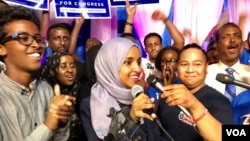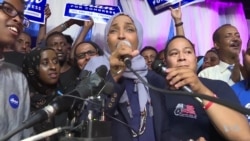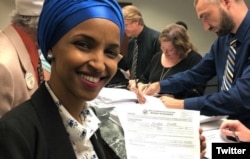A very late election night victory rally in Michigan for candidate Rashida Tlaib on Aug. 7, followed a week later by an election night victory rally in Minnesota for candidate Ilhan Omar, marked an inflection point in American politics.
The two, both Democrats, are the first Muslim-American women to win a congressional primary election. With at most token opposition in the Nov. 6 general election, they are virtually assured of seats in the U.S. House of Representatives next January.
Their historic breakthrough comes as a record number of Muslim-Americans have entered national politics, in part to protest the Trump administration’s immigration and border security policies, including an executive order upheld by the Supreme Court restricting travelers from five majority-Muslim countries.
Tlaib is the daughter of Palestinian immigrants who left the West Bank in the 1970s to settle in Detroit, where Tlaib was born and raised.
Omar was born in Somalia, but fled to a refugee camp in Kenya before reaching the large Somali community in Minneapolis. Once elected, she would succeed Keith Ellison — the first Muslim-American to be elected to Congress — as well as the first member of Congress born on the African continent.
Both women come from families shaped by war and have dealt with hostility and bigotry toward their religion from both political parties. They are part of a progressive wing of the Democratic Party hoping to take control of the House in the November midterm elections.
WATCH: Muslim-American Women in office
Tlaib and Omar say they are determined to have a voice in the national debate over immigration, border security and election integrity, among a multitude of issues that have captured their interest. They would be joining Congressman Andre Carson, an Indiana Democrat, as the only other Muslim-American holding a seat on Capitol Hill after Ellison retires from Congress.
“This win would mean so much more than just a seat in Congress,” Tlaib told VOA while walking the Detroit streets during her election campaign this summer. “It’s a powerful message.”
“This is a message to Washington to get ready for a new generation,” said Larry Jacobs, a professor at the University of Minnesota’s Humphrey School of Public Affairs, who once taught Omar when she was a student at the school. He said she has the invaluable experience of having lived abroad and fleeing her homeland for in search of a better life in the United States.
“Representative Omar is going to become a spokesperson for the opposition against President Trump’s immigration policies,” Jacobs said.
Omar and Tlaib’s campaign messaging resonated with a majority of primary election voters in both of their districts in Michigan and Minnesota — a remarkable achievement at a time of increased hostility toward their faith. Tlaib felt the sting of discrimination while serving as a lawmaker in the Michigan legislature in Lansing.
Discrimination
“An African American told one of my volunteers, we don’t care if people vote for Santa Claus, we don’t want to send Rashida to Lansing to bomb it,” Tlaib recounted.
Until now, fewer than 300 Muslim Americans served in local, state, or federal government, according to some estimates. But that is changing.
Nearly 100 Muslim Americans ran for statewide or national political office in this year’s election cycle, the highest amount since the September 11, 2001, terrorist attacks, with Tlaib and Omar the most prominent among them.
Where they have succeeded, others have fallen short. Abdul El-Sayed, a Michigan physician and former public health official, hoped to be the first Muslim American governor in the nation. He lost in Michigan’s Democratic Party primary to Gretchen Whitmer, a former Michigan state senator.
Many seeking public office cited rising harassment and marginalization of Muslim Americans, and current Trump administration policies such as the so-called “Muslim ban” on travel to the U.S. as a call to action to serve in government to help reshape public policy.
Today, Muslim Americans represent just above 1 percent of the total U.S. population, but it is a number that is rapidly growing — and with it rising Islamophobia.
The Pew Research Center found that incidents of harassment of Muslim Americans spiked in 2015 and 2016, even exceeding the number of incidents in the wake of the 2001 terrorist attacks on the United States.
“I’ve gotten people in the past who have said to me, 'You know, I don’t like your name.' That, to me, though, is, 'I don’t like your ethnicity or your faith,'” Tlaib explained.
Alvin Tillery, director of Northwestern University’s Center for Diversity and Democracy, said the election wins of both Tlaib and Omar are not surprising given the liberal districts they seek to serve. They are part of a new wave of immigration to the United States that in some ways resembles the old, he added.
“This is the quintessentially American story,” Tillery said. “It’s the story of Irish immigrants, and Italian immigrants, Polish immigrants. It’s just playing out with different ethnicities and different religions, and that’s what America is supposed to be about.”
The Pew Research Center estimates that by 2040, the Muslim faith will be the second largest religion in the U.S. Tillery said both Omar and Tlaib are the face of that phenomenon.
“If we look at how other historic barriers have come crashing down — first Catholics elected to Congress, first Jewish Americans elected to Congress — they’ve come on the heels of immigrant waves that look very similar to the waves that brought these women into the country, or at least their families, in the case of Tlaib.”




























